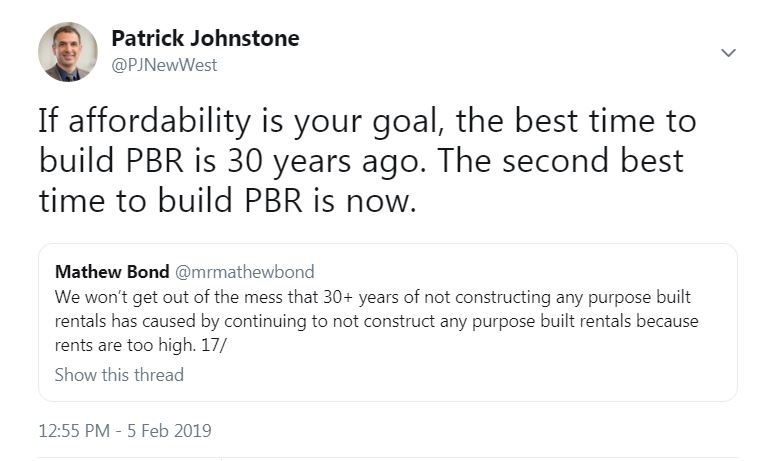For the second week in a row, we had a Council meeting where many people came to speak to a bylaw that is meant to reduce the incidence of renoviction in the City. Ironically, this week’s bylaw has much more far-reaching implications than the very limited rezoning discussion of the previous meeting, but we had nary a landlord or members of the development community come to speak against this move. We did, however, have a large number of people come to speak about the real human impacts of renoviction in our community, and remind us why these kinds of aggressive actions are needed.
As a bit of nuance, this was not a Public Hearing as constituted by the Local Government Act, like we had last week. This was an Opportunity to be Heard. We effectively operate these like a Public Hearings in New West, but they don’t have the same regulatory baggage. In short, it is a non-regulatory opportunity for the public to either send us a letter or come and speak to Council on a point of public interest.
Business Regulations and Licensing (Rental Units) Amendment Bylaw No. 8085, 2019
As I said about last week’s Bylaw to protect 18 properties in the City with Rental Tenure Zoning, we are going to need many more tools to address housing affordability in the City. This step is another bold measure that will give the City more ability to protect people who are precariously housed. This and last week’s bylaw are part of a larger Rental Housing Revitalization Initiative that will provide both metaphorical carrots and sticks within our legal authority to protect safe, secure, and affordable housing in the City and hopefully mitigate the current rental crunch and its impact on lower-income residents.
The step being adopted here is to use a tool that is not typically considered when dealing with land use tenure: our business licensing powers. Cities typically look at demo- or reno-viction through a planning context, which invokes zoning or building bylaws. However, it happens that all businesses operating rental buildings in the city require a business license to do so, and we have great flexibility in how we administer our business regulations, as long as they are fair to all businesses. Our staff have found a creative way to apply these regulatory powers to create new protections against renoviction.
Nothing on this Bylaw prevents renovation of older rental stock buildings. Instead, the Bylaw requires that the building owner provide the City a demonstration of the efforts they have taken to accommodate the residency needs of tenants prior to the City providing them a permit to perform a major renovation that requires tenant displacement. This may include providing them alternative accommodation, providing them priority to rent the same unit after renovation, or other methods to assure the resident is not made homeless. This also gives the City the ability to determine if a renovation even requires tenant removal or not.
The City can apply fines and/or a business license surcharge if these conditions are not met, and those charges may be built upon each other. We can even pull a business licence if the violations are egregious enough. Of course, exceptions are considered for life safety improvements, immediate repairs necessitated by an emergency or natural disaster, or other reasonable causes.
Much like the previous Bylaw, this change will not stand alone, and indeed the few criticisms I have heard of the Bylaw are based on thinking that it does. We cannot stop renovating our older building stock, or the most affordable housing in the City will eventually become the least livable. This is why these Bylaws exist within the framework of a wider Rental Housing Revitalization Initiative. The entire program includes an updated Rental Replacement Policy to create clear guidelines for the development community about how and when we would address the replacement of any rental stock lost through development, and an incentive program through fee and tax reductions to encourage and make more affordable the renovation of older buildings.
This is a comprehensive program that will help assure there continues to be market rental in New Westminster that is safe and livable, but stays at the affordable end of the market rental scale. This, in turn, is enhanced by the admittedly less-affordable new rental stock that is coming on line in the City which will help on the supply side and hopefully put downward pressure on market rent costs. Of course, this also relies on all three levels of government working together to bring more non-market housing on line, because “the market” will never supply the type of affordable housing needed by those 500+ families currently on the waiting list for supportive housing in New Westminster.

The work goes on. Housing affordability is a pernicious problem and we are indeed in a crisis situation in the Lower Mainland. I am proud to sit on a Council where we support taking bold action, and thank our staff – planning, business license, and legal – who have worked to find creative ways for the City to address the problem. Mostly, though, I want to thank the residents of New Westminster who live in rental buildings (44% of our residents!), some of them in somewhat precarious financial situations, for uniting and bravely bringing your voices to Council so that we have the political support to do the right thing, and so that the rest of your community can understand why the need for bold, progressive housing action exists.